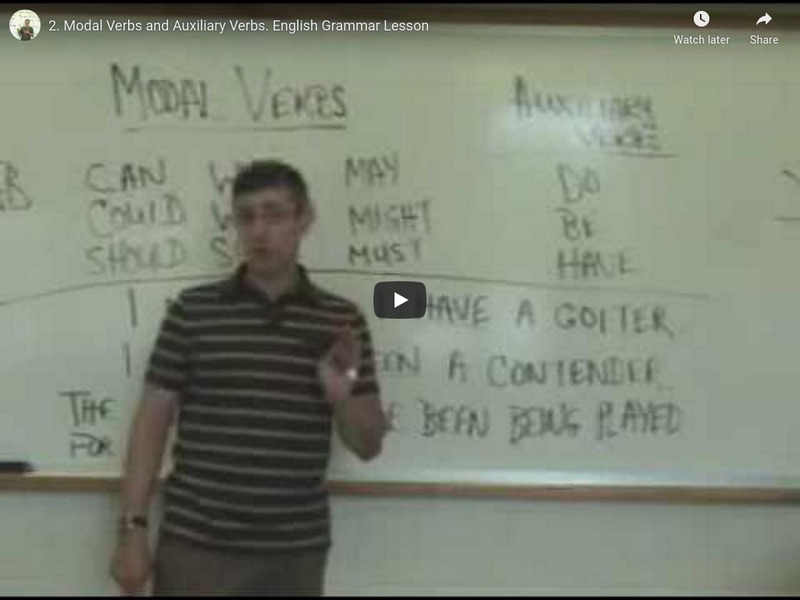Hi, what do you want to do?
Let's Tute
Understanding the Difference Between Can and Could
In this video, the teacher explains the difference between the words "can" and "could" in English. They discuss how both words can be used to seek permission and show ability, but "can" is considered less polite and more informal. The...
Englishing
What you don't know about VERBS (Stative, dynamic or both/Latinate or Germanic/Phrasal Verbs, etc.)
This series of "what you don't know about..." give a different approach to the explanation of English grammar. They simply explain what you actually do not find in grammar books. Giving a wide angle on each topic. In this lesson for...
Englishing
Lesson on Verb Patterns (verb + ING / verb + to)
This video is about verb patterns. In this mini lesson, Mr. P./Marc will explain four types of verb patterns: Verb + gerund, verb + infinitive, verb + to + gerund, and verb + base of a verb (without either an infinitive or a gerund). As...
Curated Video
IELTS Energy Podcast 954: Idioms Even Natives Get Wrong
IELTS Energy Podcast 954: Idioms Even Natives Get Wrong
Oxford Online English
Modal Verbs - How to Use Must, Have to and Should - English Grammar Lesson
In this lesson, you can learn about the modal verbs must, have to and should. Do you know the difference between 'must', 'have to' and 'should'? English learners often mix up these three verbs. In this lesson, you can learn how to use...
Englishing
ESL - Modal Verbs: May and Might
Mr. P. will begin the lesson by giving a description of modal/auxiliary verbs. He will then delve into the three different ways to use may and might. He will end the lesson by giving an exercise to complete. This lesson is designed for...
Extra English Practice
Vocabulary: Must and Have to
English grammar lesson on two commons modal verbs, with brainstorming practice activity.
Englishing
Lesson on VERB PATTERNS ( VERB + ING - VERB + TO)
This video is about verb patterns. In this mini lesson, Mr. P./Marc will explain four types of verb patterns: Verb + gerund, verb + infinitive, verb + to + gerund, and verb + base of a verb (without either an infinitive or a gerund). As...
Curated Video
May Can Could - Making Polite Requests In English
Three words we can use when making polite requests in English: May Can Could. The main difference between these words: Can, could, & may, is their level of formality. Let's explore those differences here.
Englishing
English Vocabulary Lesson on verbs of feelings (Love dancing, hate singing, like watching movies)
This video is about verbs of feelings plus verbs with -ing endings or to (infinitives). Mr. P./Marc starts the lesson by giving two easy examples showing both -ing and to forms of verbs. He then explains the difference between them and...
Curated Video
Double Contractions In English - British English Pronunciation
Learning this language just got harder...double contractions in English are crazy. Reserved for speaking only, I will help you with the British English pronunciation and understanding of these double contractions.
Oxford Online English
Using Would Have, Could Have, Should Have - English Grammar Lesson
In this lesson, you can learn how to use would have, should have and could have. These verbs—would, should, could, etc.—are modal verbs, so they don’t have past forms like normal verbs do. Instead, you can talk about the past by adding...
Yossarian the Grammarian
Modal Verbs and Auxiliary Verbs: English Grammar Lesson
This video lesson from Yossarian the Grammarian explains the functions of modal verbs and auxiliary verbs.
Sophia Learning
Sophia: Conditionals
This video defines conditionals, explains how to identify and write the three different types of conditional statements: factual, predictive, and speculative. It also discusses modal verbs and provides a list of them. [6:24]
Khan Academy
Khan Academy: Modal Verbs
There's a class of helper verbs known as modals that we use to express a bunch of conditions: we can use them to give advice, make guesses at how necessary or likely something is, make requests of people, and so on. They're super useful.
Imagine Learning Classroom
Learn Zillion: Use Modal Auxiliaries (e.g. Can, May, Must)
Writers make their writing clear by using modal auxiliaries correctly to show different times, moods or conditions. Let's practice using the modal auxiliaries can, may, and must to describe situations. [10:49]
Sophia Learning
Sophia: Modal Verbs
This is a video tutorial discussing modal verbs and their meanings [6:19]
Yossarian the Grammarian
Grammar: Modal Verbs and Auxiliary Verbs
This is a YouTube video lesson about modal and auxiliary verbs. Modals are verbs such as could, would, or might which cannot stand alone, and auxiliary verbs are verbs such as do, be, and have which can be helping verbs or can stand alone.











